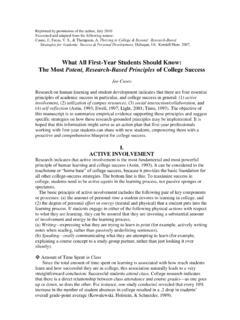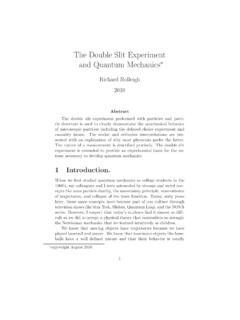Transcription of The Tragedy of the Commons Author(s): Garrett Hardin …
1 The Tragedy of the CommonsAuthor(s): Garrett HardinSource: Science, New Series, Vol. 162, No. 3859 (Dec. 13, 1968), pp. 1243-1248 Published by: American Association for the Advancement of ScienceStable URL: : 05/02/2009 12:11 Your use of the JSTOR archive indicates your acceptance of JSTOR's Terms and Conditions of Use, available JSTOR's Terms and Conditions of Use provides, in part, that unlessyou have obtained prior permission, you may not download an entire issue of a journal or multiple copies of articles, and youmay use content in the JSTOR archive only for your personal, non-commercial contact the publisher regarding any further use of this work.
2 Publisher contact information may be obtained copy of any part of a JSTOR transmission must contain the same copyright notice that appears on the screen or printedpage of such is a not-for-profit organization founded in 1995 to build trusted digital archives for scholarship. We work with thescholarly community to preserve their work and the materials they rely upon, and to build a common research platform thatpromotes the discovery and use of these resources. For more information about JSTOR, please contact Association for the Advancement of Science is collaborating with JSTOR to digitize, preserve andextend access to Shall We Maximize?
3 The Tragedy of the Commons The population problem has no technical solution; it requires a fundamental extension in morality. Garrett Hardin At the end of a thoughtful article on the future of nuclear war, Wiesner and York (1) concluded that: "Both sides in the arms race confronted by the dilemma of steadily increasing military power and steadily decreasing national security. It is our considered profes- sional judgment that this dilemma has no technical solution. If the great pow- ers continue to look for solutions in the area of science and technology only, the result will be to worsen the situa- tion.
4 " I would like to focus your attention not on the subject of the article (na- tional security in a nuclear world) but on the kind of conclusion they reached, namely that there is no technical solu- tion to the problem. An implicit and almost universal assumption of discus- sions published in professional and semipopular scientific journals is that the problem under discussion has a technical solution. A technical solution may be defined as one that requires a change only in the techniques of the natural sciences, demanding little or nothing in the way of change in human values or ideas of morality.
5 In our day (though not in earlier times) technical solutions are always welcome. Because of previous failures in prophecy, it takes courage to assert that a desired technical solution is not possible. Wiesner and York exhibited this courage; publishing in a science journal, they insisted that the solution to the problem was not to be found in the natural sciences. They cautiously qualified their statement with the phrase, "It is our considered profes- The author is professor of biology, University of California, Santa Barbara. This article is based on a presidential address presented before the meeting of the Pacific Division of the Ameri- can Association for the Advancement of Science at Utah State University, Logan, 25 June 1968.
6 13 DECEMBER 1968 sional judgment .." Whether they were right or not is not the concern of the present article. Rather, the concern here is with the important concept of a class of human problems which can be called "no technical solution problems," and, more specifically, with the identifi- cation and discussion of one of these. It is easy to show that the class is not a null class. Recall the game of tick- tack-toe. Consider the problem, "How can I win. the game of tick-tack-toe?" It is well known that I cannot, if I as- sume (in keeping with the conventions of game theory) that my opponent un- derstands the game perfectly.
7 Put an- other way, there is no "technical solu- tion" to the problem. I can win only by giving a radical meaning to the word "win." I can hit my opponent over the head; or I can drug him; or I can falsify the records. Every way in which I "win" involves, in some sense, an abandon- ment of the game, as we intuitively un- derstand it. (I can also, of course, openly abandon the game-refuse to play it. This is what most adults do.) The class of "No technical solution problems" has members. My thesis is that the "population problem," as con- ventionally conceived, is a member of this class. How it is conventionally con- ceived needs some comment.
8 It is fair to say that most people who anguish over the population problem are trying to find a way to avoid the evils of over- population without relinquishing any of the privileges they now enjoy. They think that farming the seas or develop- ing new strains of wheat will solve the problem-technologically. I try to show here that the solution they seek cannot be found. The population problem can- not be solved in a technical way, any more than can the problem of winning the game of tick-tack-toe. Population, as Malthus said, naturally tends to grow "geometrically," or, as we would now say, exponentially.
9 In a finite world this means that the per capita share of the world's goods must steadily decrease. Is ours a finite world? A fair defense can be put forward for the view that the world is infinite; or that we do not know that it is not. But, in terms of the practical problems that we must face in the next few genera- tions with the foreseeable technology, it is clear that we will greatly increase human misery if we do not, during the immediate future, assume that the world available to the terrestrial human pop- ulation is finite. "Space" is no escape (2). A finite world can support only a finite population; therefore, population growth must eventually equal zero.
10 (The case of perpetual wide fluctuations above and below zero is a trivial variant that need not be discussed.) When this condition is met, what will be the situa- tion of mankind? Specifically, can Ben- tham's goal of "the greatest good for the greatest number" be realized? No-for two reasons, each sufficient by itself. The first is a theoretical one. It is not mathematically possible to maximize for two (or more) variables at the same time. This was clearly stated by von Neumann and Morgenstern (3), but the principle is implicit in the theory of partial differential equations, dating back at least to D'Alembert (1717- 1783).











